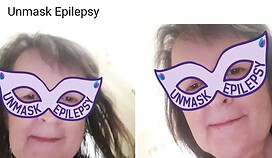Unmasking Epilepsy - Parent Perspective
How do you start a conversation? How do you get others to talk about it? Why is epilepsy rarely to never seen in media or awareness commercials? Isn't it time to unmask epilepsy?
Facing the tough questions
As a parent of a loved one with Epilepsy, a chronic or invisible illness, it's never easy learning that your child has an illness right at birth, or in my daughter's case, she was 8 years old at the original diagnosis for epilepsy. All of a sudden, your family's world has been turned upside down.
This is NOT anyone's fault; your child is NOT a burden. These are the life cards your family has been dealt, and as hard as it is to accept, it's in the best interest to get family and friend supports in place. Remind yourself that it's OK to cry, but NEVER ever give up.
Initial reactions and coping
Navigating parenthood is hard enough, then add an unexpected illness or injury to the mix. Your initial reaction may be one of shock, worry, sadness, disbelief, concern, wanting to cry, self-pity, and wanting to scream. All this while trying to listen to the doctor who is giving you the diagnosis.
I compare it to trying to listen to cartoon character Charlie Brown's teacher talking—no words, just wah, wah, wah! At the moment of the first diagnosis, nothing is clear; your mind as a parent has become extremely overwhelmed, and you don't really get a chance to absorb what the doctor is telling you.
For me personally, sharing my parent journey has never been easy. Who will hear me if I don't?
Defining unmasking
To me, unmasking epilepsy means:
- Educating myself so I can be there for my daughter and help educate others.
- Talking about epilepsy often, so others don't feel so alone and may want to share/write about their own journey.
- Keeping in touch and informed with doctors and specialists regarding your child's personal care.
- Journaling the bad days to help find solutions, keeping track of the days where everything is positive (yes, they do happen).
- Taking breaks when you can.
- Having a seizure safety plan in place (support system). Getting a support system in place—friends, family—may be difficult at first, as you all need to be on the same page when it comes to your child's care. It's important!
You never stop learning; no question is ever wrong. - Asking the tough questions, being informed, being aware.
Joining the Movement
Let's unmask epilepsy, sharing our journey, one story at a time! I hope the bit of parent perspective content helps you as a parent and/or caregiver achieve great things going forward!
Signed,
Lorrie Forseth
Parent and/or Caregiver's Perspective/Health Leader

Join the conversation